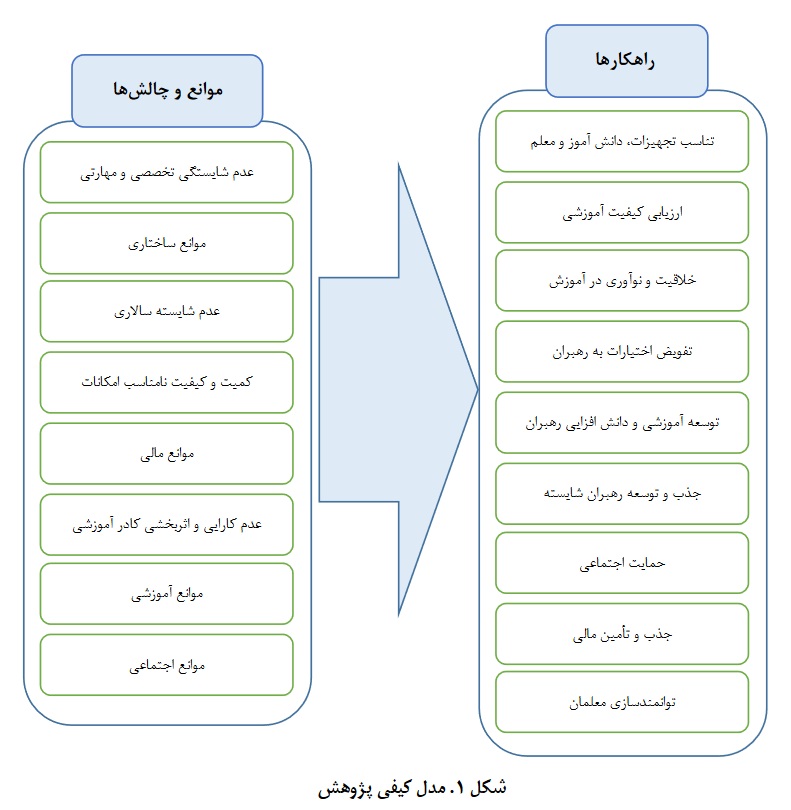Identifying Barriers and Challenges of Educational Leadership in Elementary Schools
Keywords:
Educational Manager, Educational Leadership, Elementary Schools, Leadership BarriersAbstract
Educational leaders in schools face numerous challenges due to the rapid pace of social and economic changes. Therefore, the purpose of this study was to identify the barriers and challenges of educational leadership in elementary schools. This research was conducted using an exploratory strategy. The statistical population of this study included all elementary school principals, educational management experts, and professionals in West Azerbaijan Province. The sampling method was purposive, based on the criterion of theoretical saturation, and employed a snowball technique, resulting in a sample size of 19 individuals. Data were collected through semi-structured interviews. Data analysis was conducted using open, axial, and selective coding. The results of this study identified eight main barriers to educational leadership: lack of specialized and skill-based competencies of leaders, structural barriers, lack of meritocracy, inadequate quantity and quality of facilities and equipment, financial barriers, inefficiency and ineffectiveness of educational staff, educational barriers, and social barriers. The necessary strategies to overcome these barriers and challenges facing leaders in elementary schools include aligning equipment, students, and teachers; evaluating educational quality; fostering creativity and innovation in education; delegating authority to leaders; developing educational programs and enhancing the knowledge of educational leaders; attracting and developing competent leaders; providing social support; securing funding; and empowering teachers.
Downloads
References
Tian M, Risku M. A distributed leadership perspective on the Finnish curriculum reform 2014. Journal of Curriculum
Studies. 2019;51(2):229-44. doi: 10.1080/00220272.2018.1499806. https://doi.org/10.1080/00220272.2018.1499806
Mitchell RM, Kensler LA, Tschannen-Moran M. Examining the effects of instructional leadership on school academic
press and student achievement. Journal of School Leadership. 2015;25(2):223-51. doi: 10.1177/105268461502500202.
https://doi.org/10.1177/105268461502500202
du Plessis A, Heystek J. Possibilities for distributed leadership in South African schools: Policy ambiguities and blind
spots. Educational Management Administration & Leadership. 2019. doi: 10.1177/1741143219846907.
https://doi.org/10.1177/1741143219846907
Miller PW. The nature of school leadership. The Nature of School Leadership: Palgrave Macmillan, Cham; 2018. p.
-85.
Gurr D, Drysdale L, Longmuir F, McCrohan K. The Leadership, Culture and Context Nexus: Lessons from the
Leadership of Improving Schools. International Studies in Educational Administration. 2018;46(1):22-44.
Dimmock C, Tan CY. Explaining the success of the world's leading education systems: The case of Singapore. British
Journal of Educational Studies. 2016;64(2):161-84. doi: 10.1080/00071005.2015.1116682.
https://doi.org/10.1080/00071005.2015.1116682
Meyers CV, Hambrick Hitt D. School turnaround principals: What does initial research literature suggest they are
doing to be successful? Journal of Education for Students Placed at Risk (JESPAR). 2017;22(1):38-56. doi:
1080/10824669.2016.1242070. https://doi.org/10.1080/10824669.2016.1242070
Harris A, Jones M, Huffman JB. Teachers leading educational reform: The power of professional learning
communities: Routledge; 2017.
Fullan M. All systems go: The change imperative for whole system reform: Corwin Press; 2010.
Bloom C, Owens E. Principals' Perception of Influence on Factors Affecting Student Achievement in Low- and HighAchieving Urban High Schools. Education & Urban Society. 2013;45(2):208-33. doi: 10.1177/0013124511406916.
https://doi.org/10.1177/0013124511406916
Mazurkiewicz G, Fischer JM. The Power of Responsive Educational Leadership: Building Schools for Global
Challenges: Routledge; 2021.
Zulu JK, Bhengu TT, Mkhize BN. Leadership challenges and responses to complex township school life: perspectives
from four secondary schools in South Africa. International Journal of Leadership in Education. 2021;24(2):206-25. doi:
1080/13603124.2019.1623918. https://doi.org/10.1080/13603124.2019.1623918
Day C, Sammons P. Successful leadership: A review of the international literature. Reading, England: CfBT Education
Trust; 2013.
Litz D, Hourani RB, Scott S. Leadership challenges in an educational program at a UAE juvenile detention center: A
contextual analysis. International Journal of Educational Development. 2020;76. doi: 10.1016/j.ijedudev.2020.102193.
https://doi.org/10.1016/j.ijedudev.2020.102193
Day C. Sustaining success in challenging contexts: leadership in English schools. Journal of Educational
Administration. 2005;43(6):573-83. doi: 10.1108/09578230510625674. https://doi.org/10.1108/09578230510625674
Hallinger P. Bringing context out of the shadows of leadership. Educational Management Administration &
Leadership. 2018;46(1):5-24. https://doi.org/10.1177/1741143214535744
Jeynes WH. Effects of Family Educational Cultures on Student Success at School: Directions for Leadership. How
School Leaders Contribute to Student Success: Springer, Cham; 2017. p. 311-28.
Zare S, Hosein Qolizadeh R, Mehram B. Identification and description of the dominant leadership model and its
characteristics in high schools in Birjand. Management and Planning in Educational Systems. 2019;12(1):339-68. doi:
29252/mpes.12.1.339. https://doi.org/10.29252/mpes.12.1.339
Mard SM, Zeynabadi HR, Abdollahi B, Arasteh HR. Indicators of a successful educational leader: Findings from a
phenomenological study. School Management. 2017;5(2):109-28.
Creswell JW, Miller DL. Determining validity in qualitative inquiry. Theory into Practice. 2000;39(3):124-30. doi:
1207/s15430421tip3903_2. https://doi.org/10.1207/s15430421tip3903_2
Ebrahimizadeh B, Nazem F. Identification and formulation of the components affecting the competency model of
primary school managers in Tehran. Quarterly Journal of Educational Leadership and Management. 2018;12(4):9-23.
Moswela B, Kgosidialwa K. Leadership and school success: Barriers to leadership in Botswana primary and secondary
schools. Educational Management Administration & Leadership. 2019;47(3):443-56. doi: 10.1177/1741143217739355.
https://doi.org/10.1177/1741143217739355
Garza JE, Drysdale L, Gurr D, Jacobson S, Merchant B. Leadership for school success: Lessons from effective
principals. International Journal of Educational Management. 2014;28(7):798-811. doi: 10.1108/IJEM-08-2013-0125.
https://doi.org/10.1108/IJEM-08-2013-0125
González-Falcón I, García-Rodríguez MP, Gómez-Hurtado I, Carrasco-Macías MJ. The importance of principal
leadership and context for school success: insights from '(in) visible school'. School Leadership & Management. 2019:1-18.
doi: 10.1080/13632434.2019.1612355. https://doi.org/10.1080/13632434.2019.1612355
Hemmatyar Z, Abdollahi B, Nooh Ebrahim A, Zeynabadi HR. Identification of dimensions and behavioral
components of visionary educational leaders in primary schools: A phenomenological study. School Management.
;7(3):172-91.
Freeman GT, Fields D. School leadership in an urban context: complicating notions of effective principal leadership,
organizational setting, and teacher commitment to students. International Journal of Leadership in Education. 2020:22-42. doi:
1080/13603124.2020.1818133. https://doi.org/10.1080/13603124.2020.1818133
Brauckmann S, Pashiardis P, Ärlestig H. Bringing context and educational leadership together: Fostering the
professional development of school principals. Professional Development in Education. 2020:1-12. doi:
1080/19415257.2020.1747105. https://doi.org/10.1080/19415257.2020.1747105

Downloads
Published
Submitted
Revised
Accepted
Issue
Section
License
Copyright (c) 2024 Journal of Study and Innovation in Education and Development

This work is licensed under a Creative Commons Attribution-NonCommercial 4.0 International License.










